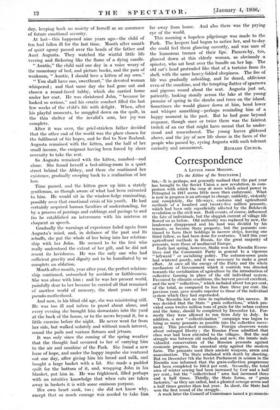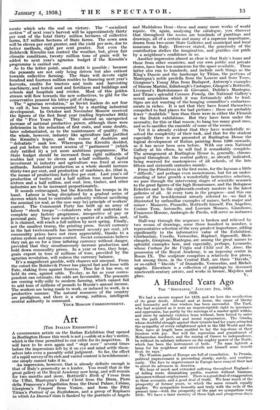Correspondence
A LETTER FROM MOSCOW. [To the Editor of the SPECTATOR.] SIR,—It is, perhaps, not generally realized that the past year has brought to the Soviet Union a new revolution, in com- parison with which the coup de main which seized power in Petrograd in 1917 seems little more than embryonic. What is now in progress is an attempt to change, suddenly, violently and completely, • the life-ways, customs and agricultural methods of a hundred and twenty-five million peasants, which had been only superficially affected by the Bolshevik revolution or the civil war. -Both events, of course, influenced the fate of individuals, but the sluggish current of village life flowed on as before. Old authority was replaced by new, the landowner disappeared and his land was divided by his tenants, or became State property, but the peasants con- tinued to farm their holdings in narrow strips, leaving one third fallow, as had been done for centuries. Until this year agricultural methods in Russia, for the great majority of peasants, were those of mediaeval Europe.
Early last spring, however, Stalin won the Kremlin Execu- tives and the Communist Party in general to a vigorous " leftward " or socializing policy. The autumn-sown grain had wintered poorly, and it was necessary to make a great effort. At once all the energy of the Party and. the whole mechanism of Government which it controls was directed towards the socialization of agriculture by the introduction of collective farming in place of the old individual system. Favoured by climatic conditions, the harvest proved excellent, and the new "collectives," which included about` ten per cent. of the total, as compared to less than three per cent, the previous year, gave results superior to those of the individual system which they had superseded.
The Kremlin lost no time in capitalizing this success. It was decided that the State "grain collections," which pro- vided some twelve million tons of grain for the urban centres and the Army, should be completed by December 1st. For- merly they were allowed to run from July to July. In addition, a new " collectivization " campaign was begun to bring as many peasants as possible into the collective move- ment. This provoked resistance. Foreign observers wrote about outraged liberty ; the Russian Press admitted that class war had been extended to. the villages. But the real struggle was between old methods and new, the innate indi- vidualist conservatism of the Russian peasants against economic progress, the ancestral strip against the modern farm. The peasants used their ancient weapons, arson and assassination. The State retaliated with death by shooting. But on December 7th the Soviet Parliament in session in the Kremlin Ives informed that. the grain-collection programme had been completed to 100.2 per cent. Secondly, .the total area of winter sowing had been increased by four and a half per cent. but the "collectivized" area had increased three and a half times. Thirdly,- the State farms, or t` grain factories,"-as they are called, had .a planted acreage seven and a .half times greater than last year. In Short, the State had won the first round of the struggle. A week later 'the Council of Conunisaars issued.a pranuncia- mento which sets the seal on victory. The "socialized section" of next year's harvest will be approximately thirty per cent of the total thirty million hectares of collective farms, 8.7 million hectares of State farms. The sown area will be eleven per cent greater, and the yield per acre, due to better methods, eight per cent greater. Not even the Bolshevik Kremlin can control the weather, but, given fair climatic conditions, twenty million tons of grain will be added to next year's agrarian budget if the Kremlin's programme is carried out. As to the latter point, small doubt is possible • because the peasants are not only being driven but also enticed towards collective farming. The State will devote eight hundred and fourteen million roubles to financing next year's harvests, credits for tractors and tools and harvesting machinery, and tested seed and fertilizers and buildings and schools and hospitals and creches. Most of this golden stream will flow towards the new collectives, to gild for the conservative peasant his bitter pill of change. The "agrarian revolution," as Soviet leaders do not fear to call it, has been accompanied by a startling industrial development. In October and November Moscow received the figures of the first fiscal year (ending September 30th) of the Five Years Plan." They showed an unexpected increase of national productive power, although there were deficiencies in the reduction of first costs, and some doubts, later substantiated, as to the maintenance of quality. On the whole, however, industry like agriculture had justified the Kremlin's hopes, and the voices of doubters and " defeatists " sank low. Whereupon the Kremlin decided, and put before the recent session of " parliament " (which duly ratified it) a yet more ambitious programme. The State budget should be increased from eight milliards of roubles last year to eleven and a-half milliards. Capital investment in industry and agriculture was fixed at seven milliards. Industrial production as a whole should increase thirty-two per cent, and production of machines, &c. (that is, the means of production) forty-five per cent. Last year's oil production of twelve and a half million tons must become sixteen and a half million, and coal, iron, timber, and other industries are to be increased proportionately.
It sounds extravagant, but the Kremlin has trumps in its hand. Labour is being disciplined by a gradual series of decrees which tend to centralize authority without sacrificing the nominal (or real, as the case may be) principle of workers' control. The Communist Party has built up an army of labour "shock troops "—volunteers who will undertake to complete any factory programme, irrespective of pay or personal gain. They now number a quarter of a million, and, it is claimed, will reach a full million by next spring. Finally, not the smallest trump, the printing press. Soviet currency in the last twelvemonth has increased seventy per cent, yet commodity prices have not risen appreciably, thanks to a ration system and rigorous control. Soviet economists believe they can go on for a time inflating currency without danger, provided that they simultaneously increase production and hold down commodity prices. In a year or two, they hope, grain export in tens of millions of tons, provided by the agrarian revolution, will redress the currency balance. It's a magnificent gamble, with chances not unequal. From the outset the Bolshevik Power has played fast and loose with Fate, staking lives against Success. Thus far it has won, or held its own, against odds. To-day, as far as your corres- pondent can estimate, the odds are favourable. The peasants are coming willy-nilly to modern farming, which cannot fail to add tens of millions of pounds to Russia's annual income. The workers are being made to work, or induced to work, in a productive manner. The natural resources of the country are prodigious, and there is a strong, ruthless, intelligent central authority in command. YOUR MOSCOW CORRESPONDENT.











































 Previous page
Previous page